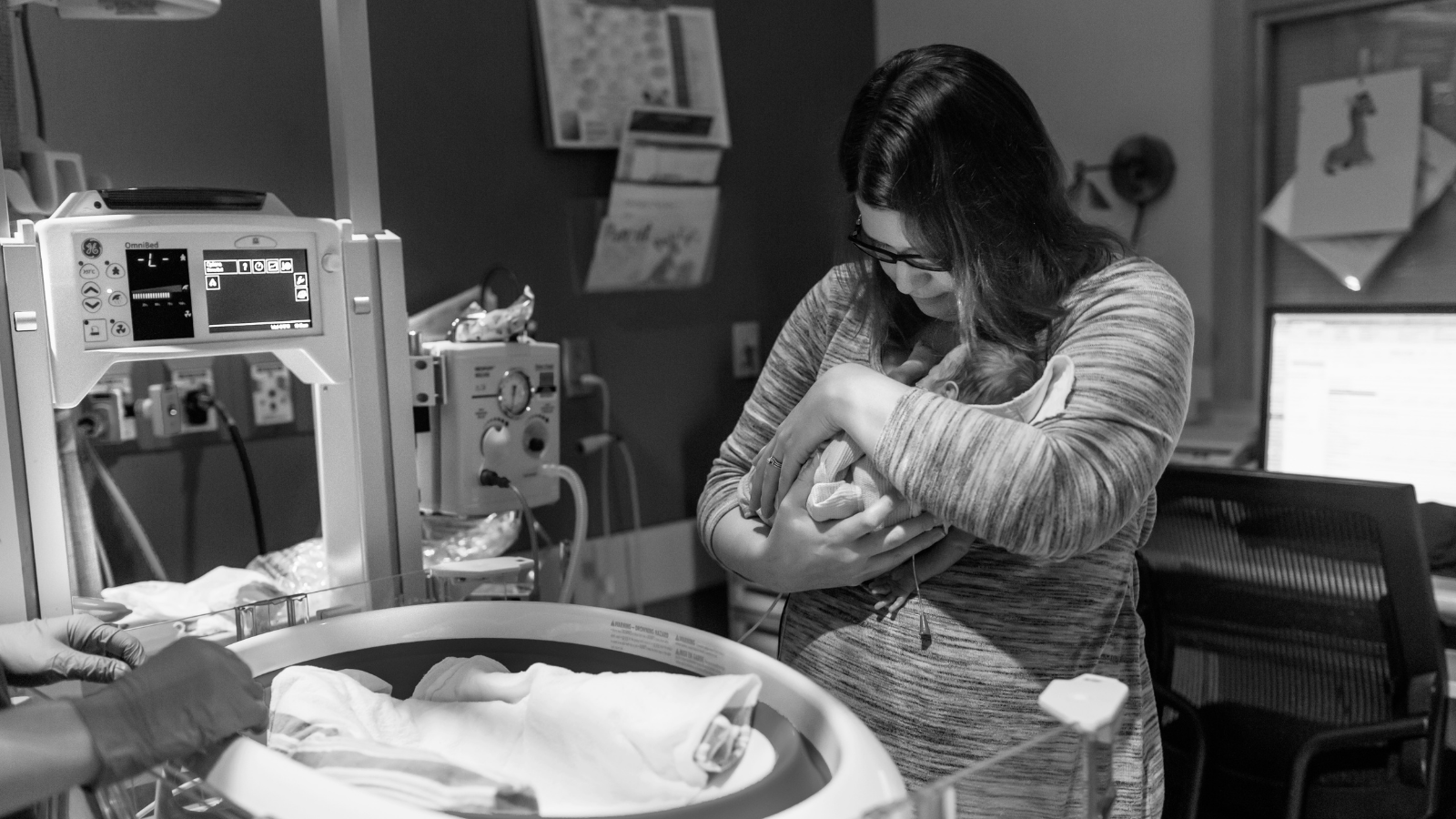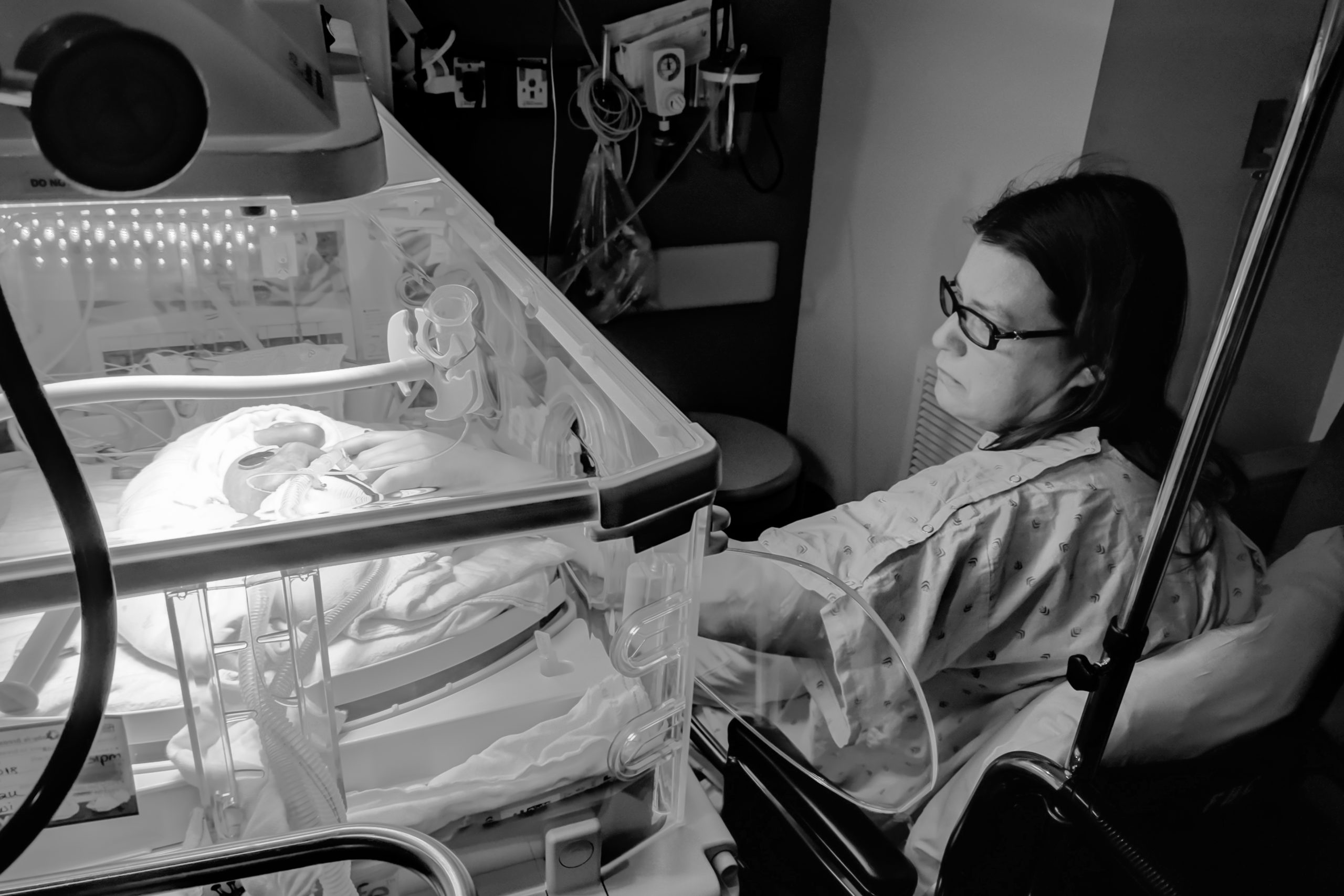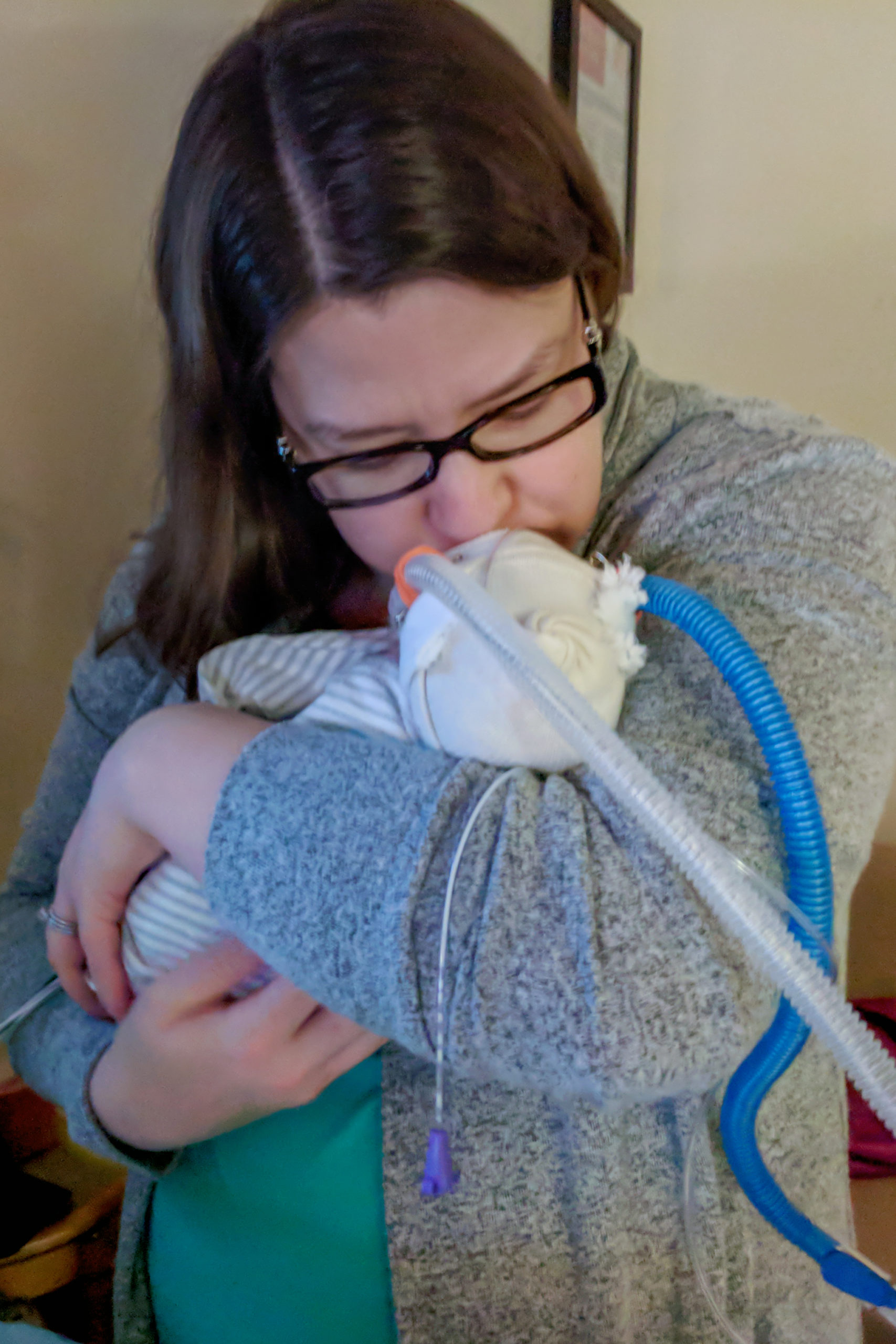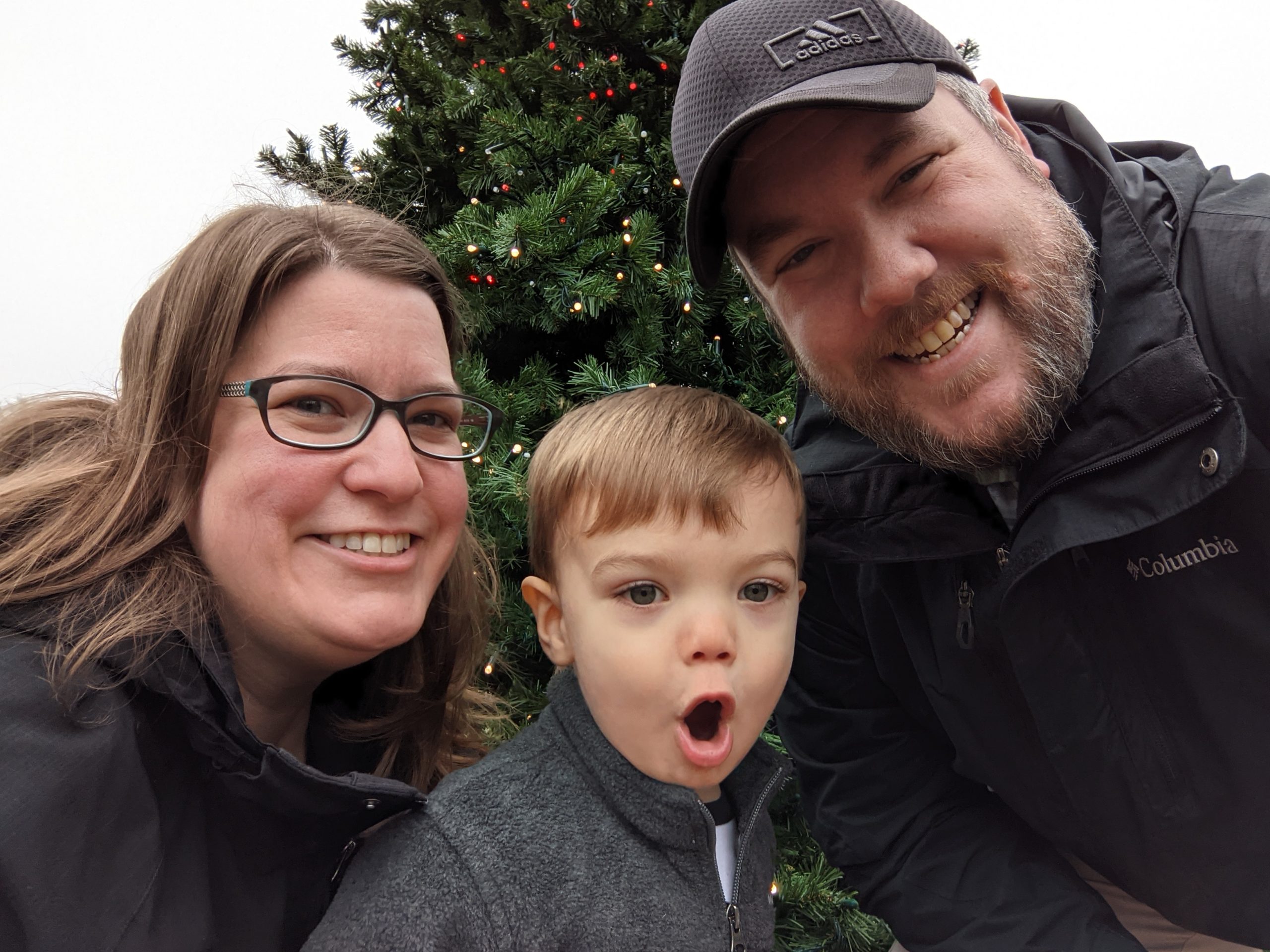
Photo credit: Mellissa Stanturf, courtesy of Jenni Kistler
by Jenni Kistler
My mental health journey has been a challenging one for as long as I can remember. In college, I battled depression so badly I had no choice but to take a semester off to focus on getting well. Therapy several times a week and finding medications that worked for me saved my life.
When we discussed having a family, I knew that addressing my mental health and the risks that may come with introducing pregnancy, hormones, life changes, and potential medication changes, would be necessary. What I didn’t consider was that we would be faced with a sudden and urgent delivery of a preterm baby and a two-month NICU stay.
On the night of February 28th I was awoken sudden by intense upper right quadrant pain. I know what you’re thinking – go to the hospital! Instead, I, in my barely starting to show, first time mom brain thought, “Oh, huh. I wonder if these are Braxton-Hicks contractions. But those aren’t supposed to hurt. If this ‘doesn’t hurt’ I am in for some real trouble at delivery time!”
I made it through the night and called my OB’s office from the car as I drove in to work. I hadn’t been feeling great, but that was nothing new for me at this point. The nurse suggested that it was probably just round ligament pain and that I shouldn’t worry. I disagreed and thought that it was likely more. She begrudgingly offered that I could come in for a blood pressure check, but it was certainly not concerning enough to rush, so whenever it was convenient. I told her I’d be there in about ten minutes.
As you probably expect, I was quickly sent to the hospital from there, where I was admitted, hooked up to magnesium sulfate, and provided with my very own preeclampsia diagnosis. In the following days we learned that I’d be residing in antepartum until delivery, which would be soon.
I lasted exactly one week before I received a HELLP diagnosis and required an urgent c-section delivery. At 28 weeks, 4 days gestation, my child came into this world to save both of our lives.
The next 24 hours are gone from my memory. I know that my husband went to be with our baby. I know that I had more drugs to save my life. I now know that my baby had some pretty significant life saving measures himself. But I hadn’t yet had time to process any of this, which was probably a very good thing.
41 hours after my child was born, I was finally able to go meet him. The sheer amount of love and guilt that hit me when I saw his tiny body, lit up by the bili light, in his isolette, was unlike anything I could have ever expected. The nurses were trying to introduce me to the NICU and fill me in on this tiny human who grew in me for 28 weeks but whom I knew nothing about. We were supposed to name him. I felt that I couldn’t name him without meeting him first. But nurses needed a name for his records…and for his health.

Photo credit: Mellissa Stanturf, courtesy of Jenni Kistler
LISTEN NOW: THE NICU NOW PODCAST – FOR FAMILIES CURRENTLY ON THE NICU JOURNEY
Strangers knew more of him than I did. There were rules to learn, new processes, routines, people – so many people! And there was this tiny human stranger in front of me that I was supposed to love and grow and protect and nurture…who I failed.
I had a complete and utter public breakdown that day. And it was probably one of the healthiest mental health choices that I could have made, to let myself fully feel and experience those feelings.

“This was the first time I felt like a mom, like I could hold him like a ‘real baby.'” Photo credit: Mellissa Stanturf, courtesy of Jenni Kistler.
In our NICU there were two sides, affectionately called, the “light” side and the “dark” side. The smallest of the babies who need to be kept from stimuli are on the dark side until about 32 weeks gestation, when they start gradually transitioning over to the light side. I felt that since my body had failed to properly grow my child, I had to at least be able to nourish him. I gave my everything to breastfeeding efforts. I want to share clearly – please do not feel like you have done anything to fail your child or that you must breastfeed to be a successful mother. I do not regret breastfeeding, but I do regret putting so much pressure on myself to do so. As we were on the ‘dark’ side, and I was intent on spending as much time with my child as I could, I was spending about 8-10 hours a day sitting in a dark room, mostly alone, with a pump, focused on one task. This is not healthy for anyone. Please don’t sit in the dark, certainly not alone, or all day.
Fortunately, we had some amazing nurses who knew not only how to care for tiny humans, but for their parents as well. They would push me, sometimes pretty forcefully, to just walk downstairs and out the front doors to breathe some fresh air. To go down to the cafeteria to get some food, out to dinner with my husband or home to sleep in my own bed (I had been ‘crashing’ in open hospital rooms wherever available). They reminded me that never again would we have such highly qualified babysitters at our disposal and that we should take advantage of the opportunity. One nurse, when I was having some pretty tough challenges, said to me, “What words do you need to hear come out of my mouth so that you know that you are doing a great job?” These nurses have become family. Be sure that you find your little escapes to take a breath and take a break. Connect with your advocates.
Post-NICU brought its own set of challenges, but also a reminder that I no longer had the support of our nursing team and that I was again responsible for my mental health management. Always fearful of a dark relapse since the college scare, I knew that being proactive was important. At one point, I recall telling my husband that I was so tired that I wished, just a little bit, that I would get in a car accident. Not where anyone got really hurt, and certainly not with my child in the car, but maybe just enough that I would have to go to the hospital and get a full night’s sleep. While this may not necessarily be unusual to think, it’s certainly not healthy. It’s important that you and those around you recognize when thoughts creep into the unsafe zone and also recognize the level of safety risk that these thoughts may pose to you and your child(ren) and that you get help addressing them.
I called my therapist and made an appointment. And, for the next few months, my baby and I went to therapy – together! My therapist certainly didn’t mind that he joined. I like to think that most therapists are more interested in healthy parents than the potential for distraction by having an infant in their arms. Please don’t let lack of childcare for your new baby stop you from getting mental health care. It didn’t take long before I was feeling back on track. Mental health, like physical health, requires regular care, and I continue to monitor my own mental health each day and practice self-care as best I can to stay feeling my best.

Photo courtesy Jenni Kistler
